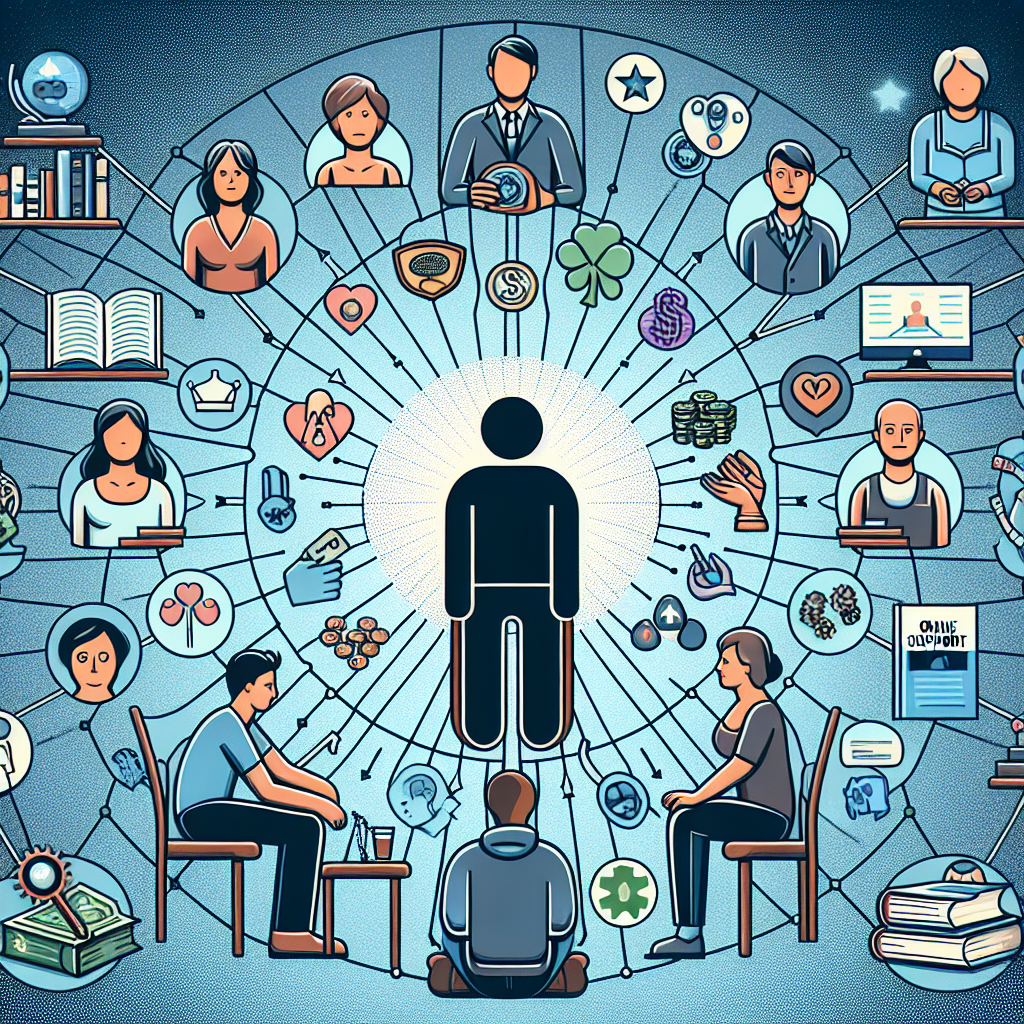-
Table of Contents

“Building Bridges to Recovery: Creating a Strong Support Network for Gambling Addiction.”
Introduction
Creating a support network for gambling addiction recovery involves several key steps to ensure individuals have the necessary resources and emotional backing to overcome their addiction. First, it is crucial to identify and reach out to trusted friends and family members who can offer understanding and encouragement. Joining support groups, such as Gamblers Anonymous, provides a community of individuals facing similar challenges, fostering a sense of belonging and shared experience. Professional help from therapists or counselors specializing in addiction can offer tailored strategies and coping mechanisms. Additionally, leveraging online forums and resources can provide continuous support and information. Building a comprehensive support network requires a combination of personal connections, professional guidance, and community resources to create a robust foundation for recovery.
Building a Strong Support Network for Gambling Addiction Recovery
Creating a support network for gambling addiction recovery is a crucial step in the journey towards healing and reclaiming control over one’s life. The process begins with acknowledging the problem and understanding that seeking help is a sign of strength, not weakness. Once this realization is made, the next step is to build a robust support system that can provide emotional, psychological, and practical assistance throughout the recovery process.
One of the first and most important components of a support network is family. Family members can offer unconditional love and understanding, which are essential for someone struggling with gambling addiction. Open communication within the family can help create a safe space where the individual feels comfortable sharing their struggles and progress. It is important for family members to educate themselves about gambling addiction to provide informed support and avoid enabling behaviors.
In addition to family, friends play a significant role in the support network. True friends will stand by the individual, offering encouragement and companionship. They can help by participating in healthy, non-gambling-related activities, which can serve as positive distractions and reduce the temptation to gamble. Friends can also be a source of accountability, gently reminding the individual of their commitment to recovery.
Professional help is another critical element of a support network. Therapists and counselors who specialize in gambling addiction can provide tailored treatment plans and coping strategies. Cognitive-behavioral therapy (CBT) is particularly effective in addressing the underlying thought patterns that contribute to addictive behaviors. Support groups, such as Gamblers Anonymous, offer a community of individuals who understand the challenges of gambling addiction firsthand. These groups provide a platform for sharing experiences, offering mutual support, and celebrating milestones in recovery.
Moreover, financial advisors can be invaluable in helping individuals regain control over their finances. Gambling addiction often leads to significant financial problems, and professional guidance can assist in creating a realistic budget, managing debt, and developing a plan for financial stability. This practical support can alleviate some of the stress associated with financial difficulties, allowing the individual to focus more on their recovery.
Employers and colleagues can also be part of the support network. Informing a trusted supervisor or HR representative about the addiction can lead to accommodations that support recovery, such as flexible work hours for attending therapy sessions. Colleagues who are aware of the situation can offer understanding and support, creating a more compassionate work environment.
Online communities and forums dedicated to gambling addiction recovery can provide additional support. These platforms offer anonymity and accessibility, allowing individuals to seek advice, share their stories, and connect with others at any time. The sense of belonging to a community that understands their struggles can be incredibly empowering.
Finally, self-care is an essential aspect of building a support network. Encouraging the individual to engage in activities that promote physical and mental well-being, such as exercise, meditation, and hobbies, can enhance their overall quality of life. Developing healthy routines and finding joy in non-gambling-related activities can significantly contribute to long-term recovery.
In conclusion, creating a support network for gambling addiction recovery involves a multifaceted approach that includes family, friends, professionals, and self-care. By fostering a supportive environment and utilizing available resources, individuals can navigate the challenges of recovery with resilience and hope. The journey may be difficult, but with a strong support network, it is entirely possible to overcome gambling addiction and build a fulfilling, addiction-free life.
Key Steps to Establishing a Support System for Overcoming Gambling Addiction
Creating a support network for gambling addiction recovery is a crucial step in the journey towards healing and reclaiming control over one’s life. The process begins with acknowledging the problem and understanding that seeking help is a sign of strength, not weakness. Once this realization is made, the next step involves reaching out to trusted individuals who can offer emotional and practical support. This can include family members, friends, or colleagues who are willing to listen without judgment and provide encouragement throughout the recovery process.
In addition to personal connections, professional support is essential. Engaging with a therapist or counselor who specializes in addiction can provide invaluable guidance and coping strategies. These professionals can help identify underlying issues that may contribute to gambling behavior and work with individuals to develop healthier habits. Furthermore, joining a support group, such as Gamblers Anonymous, can offer a sense of community and shared experience. These groups provide a safe space to share struggles and successes, fostering a sense of belonging and mutual support.
Another key aspect of building a support network is educating oneself and others about gambling addiction. Understanding the nature of the addiction, its triggers, and its impact can help both the individual and their support network develop empathy and effective strategies for managing the addiction. This knowledge can also empower the individual to make informed decisions about their recovery and set realistic goals.
Setting boundaries is also an important step in establishing a support system. This involves creating a structured environment that minimizes exposure to gambling opportunities and reduces the risk of relapse. For example, limiting access to money, avoiding places where gambling occurs, and finding alternative activities to fill the time previously spent gambling can all contribute to a more supportive environment. Communicating these boundaries to the support network ensures that everyone is on the same page and can help reinforce these protective measures.
Moreover, self-care plays a vital role in recovery. Encouraging the individual to engage in activities that promote physical, emotional, and mental well-being can enhance their resilience and ability to cope with stress. This might include regular exercise, healthy eating, mindfulness practices, and hobbies that bring joy and fulfillment. A support network can assist by participating in these activities together, offering companionship and motivation.
It is also important to celebrate progress, no matter how small. Recovery is a gradual process, and acknowledging achievements along the way can boost morale and reinforce positive behavior. Support networks can play a significant role in this by offering praise and recognition for milestones reached, whether it’s a day, a week, or a month free from gambling.
Lastly, maintaining open and honest communication within the support network is essential. Regular check-ins and discussions about feelings, challenges, and progress can help keep everyone connected and focused on the recovery goals. This ongoing dialogue ensures that the individual does not feel isolated and that their support network remains engaged and responsive to their needs.
In conclusion, creating a support network for gambling addiction recovery involves a combination of personal connections, professional help, education, boundary-setting, self-care, celebration of progress, and open communication. By taking these steps, individuals can build a strong foundation for their recovery journey, surrounded by people who understand, support, and encourage them every step of the way.
Q&A
1. **Question:** What are some key components of a support network for gambling addiction recovery?
**Answer:** Key components include professional counseling, support groups like Gamblers Anonymous, family and friends, financial advisors, and online resources.
2. **Question:** How can family and friends contribute to a support network for someone recovering from gambling addiction?
**Answer:** Family and friends can provide emotional support, help monitor behavior, encourage participation in recovery programs, and assist in managing finances to prevent relapse.
Conclusion
Creating a support network for gambling addiction recovery involves several key steps: identifying and reaching out to trusted friends and family members who can offer emotional support, joining support groups such as Gamblers Anonymous to connect with others facing similar challenges, seeking professional help from therapists or counselors specializing in addiction, utilizing online forums and resources for additional guidance and community, and establishing a structured plan that includes regular check-ins and accountability measures. This multifaceted approach ensures a comprehensive support system that addresses both emotional and practical aspects of recovery.



